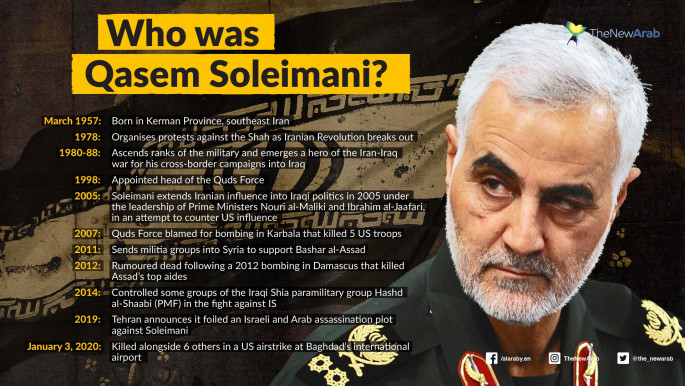Iran designates US soldiers 'terrorists' for killing Qasem Soleimani
Qasem Soleimani, the deceased leader of the Revolutionary Guards' foreign operations arm, was killed in a US drone strike outside Baghdad airport on Friday.
Under the newly adopted bill, all US forces and employees of the Pentagon and affiliated organisations, agents and commanders and those who ordered the "martyrdom" of Soleimani were designated as "terrorists".
"Any aid to these forces, including military, intelligence, financial, technical, service or logistical, will be considered as cooperation in a terrorist act," parliament said.
Lawmakers also voted to bolster by 200 million euros the coffers of the Quds Force - the foreign operations arm of Iran's Revolutionary Guards that was headed by Soleimani.
The bill was an amended version of a law adopted in April last year that declared the United States a "state sponsor of terrorism" and its forces in the region "terror groups".
Iran's top security body, the Supreme National Security Council, said that blackisting came after the US designated Iran's Revolutionary Guards a "terrorist organisation".
Tensions increase
Donald Trump has continued to be antagonistic on Twitter, and yesterday took to the social networking platform to tell his followers that Iran will "never" have nuclear weapons, as the country abandoned key parts of the 2015 nuclear deal.
|
Tehran says it intends to respond to US aggression in kind, and Brigadier General Dehghan affirmed that the response will be "for sure military" in the most specific and direct threat openly delivered by a senior Iranian official since the killing of Soleiman and Iraqi paramilitary leader Abu Mahdi al-Muhandis.
Read More: The Iraq Report: Iran's power in Iraq now questioned after US kills Soleimani
The reprisal attack would not be carried out by Iran-allied militia in the region, but directly from Iran.
"It might be argued that there could be proxy operations.
We can say America, Mr. Trump, has taken action directly against us - so we take direct action against America."
America reacted to Iran's posturing by reportedly detaining and questioning passengers of Iranian descent re-entering the country, according to Muslim rights organisation CAIR.
The US Customs & Border Protection (CBP) allegedly received a notice to report and detain all "suspicious" Iranians entering the country, irrespective of their immigration and citizenship status.
The move also targets American-Iranians who were born and raised in the US, a press released by CAIR stated.
 |
A number of those held at the border control were refused entry into the United States, including American-Iranians that were attending an Iranian concert across the border in Vancouver this weekend.
"The vast majority of people being held last night were American citizens," 24-year old Crystal, whose entire family was questioned for ten hours, said.
CBP issued a statement denying the "false" reports, though rights organisers at the scene accused the government agency of "lying".
European leaders want de-escalation
The leaders of Germany, France and the UK on Sunday urged Iran to drop measures that go against the 2015 nuclear deal, after Tehran announced it would no longer abide by a limit on enrichment.
"We call on Iran to withdraw all measures that are not in line with the nuclear agreement," German Chancellor Angela Merkel, French President Emmanuel Macron and British PM Boris Johnson said in a joint statement.
The 2015 agreement negotiated between Iran and the UN Security Council permanent members - the UK, France, China, Russia and the US - plus Germany offered Tehran relief from stinging sanctions in return for curbs to prevent it acquiring nuclear weapons.
"It is crucial now to de-escalate. We call on all the players involved to show utmost restraint and responsibility".
Follow us on Twitter and Instagram to stay connected



